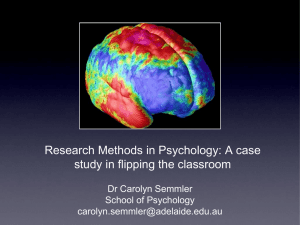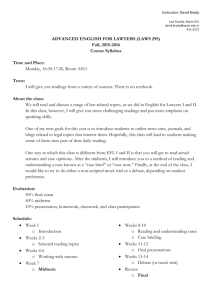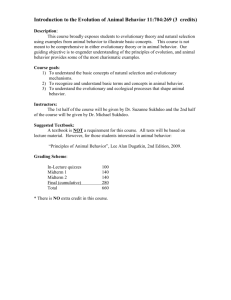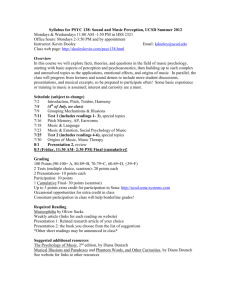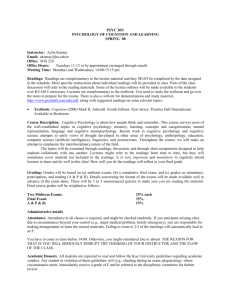psychology fundamentals
advertisement
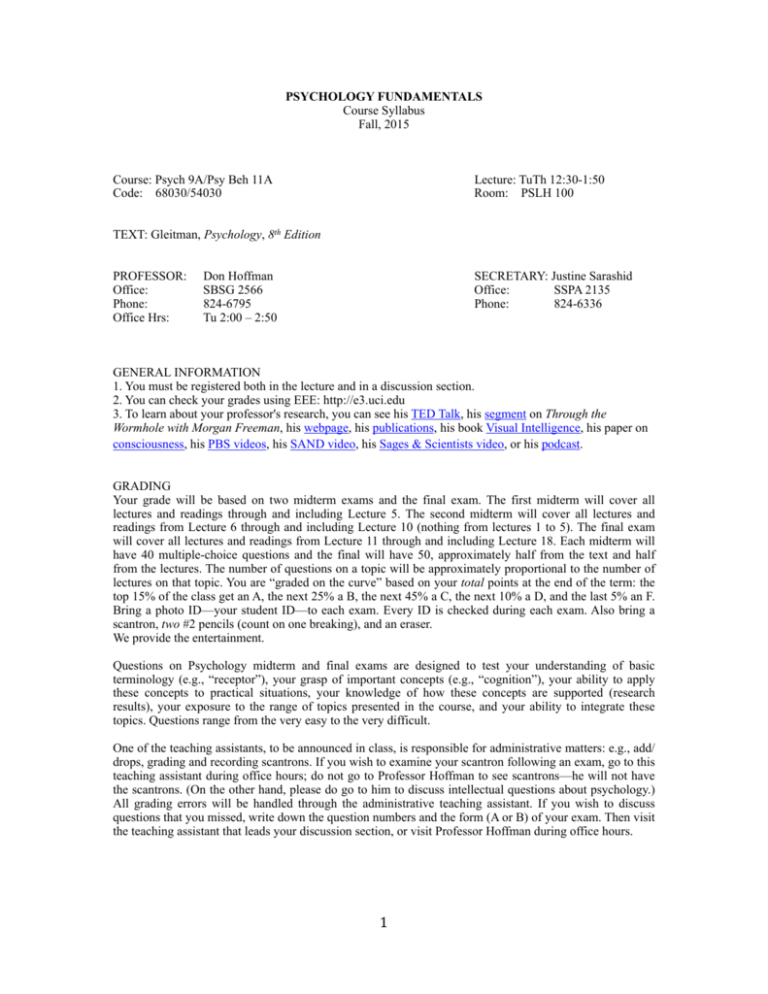
PSYCHOLOGY FUNDAMENTALS Course Syllabus Fall, 2015 Course: Psych 9A/Psy Beh 11A Code: 68030/54030 Lecture: TuTh 12:30-1:50 Room: PSLH 100 TEXT: Gleitman, Psychology, 8th Edition PROFESSOR: Office: Phone: Office Hrs: Don Hoffman SBSG 2566 824-6795 Tu 2:00 – 2:50 SECRETARY: Justine Sarashid Office: SSPA 2135 Phone: 824-6336 GENERAL INFORMATION 1. You must be registered both in the lecture and in a discussion section. 2. You can check your grades using EEE: http://e3.uci.edu 3. To learn about your professor's research, you can see his TED Talk, his segment on Through the Wormhole with Morgan Freeman, his webpage, his publications, his book Visual Intelligence, his paper on consciousness, his PBS videos, his SAND video, his Sages & Scientists video, or his podcast. GRADING Your grade will be based on two midterm exams and the final exam. The first midterm will cover all lectures and readings through and including Lecture 5. The second midterm will cover all lectures and readings from Lecture 6 through and including Lecture 10 (nothing from lectures 1 to 5). The final exam will cover all lectures and readings from Lecture 11 through and including Lecture 18. Each midterm will have 40 multiple-choice questions and the final will have 50, approximately half from the text and half from the lectures. The number of questions on a topic will be approximately proportional to the number of lectures on that topic. You are “graded on the curve” based on your total points at the end of the term: the top 15% of the class get an A, the next 25% a B, the next 45% a C, the next 10% a D, and the last 5% an F. Bring a photo ID—your student ID—to each exam. Every ID is checked during each exam. Also bring a scantron, two #2 pencils (count on one breaking), and an eraser. We provide the entertainment. Questions on Psychology midterm and final exams are designed to test your understanding of basic terminology (e.g., “receptor”), your grasp of important concepts (e.g., “cognition”), your ability to apply these concepts to practical situations, your knowledge of how these concepts are supported (research results), your exposure to the range of topics presented in the course, and your ability to integrate these topics. Questions range from the very easy to the very difficult. One of the teaching assistants, to be announced in class, is responsible for administrative matters: e.g., add/ drops, grading and recording scantrons. If you wish to examine your scantron following an exam, go to this teaching assistant during office hours; do not go to Professor Hoffman to see scantrons—he will not have the scantrons. (On the other hand, please do go to him to discuss intellectual questions about psychology.) All grading errors will be handled through the administrative teaching assistant. If you wish to discuss questions that you missed, write down the question numbers and the form (A or B) of your exam. Then visit the teaching assistant that leads your discussion section, or visit Professor Hoffman during office hours. 1 EXTRA CREDIT You may earn up to a total of 6 extra credit points by volunteering to participate in laboratory experiments. As subjects in experiments, you have the opportunity to learn how experimental research in psychology is conducted today, and you help provide the necessary subjects for the School's extensive research program. You will receive 1.5 points for each hour that you participate, with your maximum participation limited to 4 hours (i.e., 6 points). Sign-up online using this link: http://hsl.ss.uci.edu. If you agree to take part in an experiment, you form a contract with the experimenter to be punctually present at the time and place designated on the sign-up sheet. If you must cancel your appointment, do so using the above website at least one hour before the time of the experiment. Your attendance at the experiment is recorded by the laboratory assistant. Experimenters may run out of experiments before the end of the quarter, so early participation is the safest way to ensure that you don't miss out on this easy way to get points. Instead of volunteering to participate in experiments, you may write a 4-page (double-space typewritten) paper for up to 6 points of extra credit. You must get approval from your TA for the topic of the paper, and the TA will grade the paper and decide, based on its quality, how many points of extra credit it receives. Papers are due by the end of class on Tuesday of the last week of classes. Late papers receive no credit. You can combine points from writing a paper and volunteering in experiments—up to a total of 6 points. Extra credit points can raise your final grade by only one grade boundary, e.g., from B+ to A- or from C to C+. A WORD TO THE WISE As you can see from the schedule below, this class involves substantial reading. I suggest reading the material at least twice before each exam. Reading a bit each day is more effective than cramming. SCHEDULE OF LECTURES AND READINGS Lecture Date Topic 1 Th 9/24 Psychology as a Science 2 Tu 9/29 Biology and Behavior 3 Th 10/1 Biology and Behavior 4 Tu 10/6 Biology and Behavior 5 Th 10/8 Biology and Behavior 6 Tu 10/13 Evolutionary Psychology Chapter Prologue 3 3 3 3 2 — Th 10/15 FIRST MIDTERM 7 8 9 10 11 Tu 10/20 Th 10/22 Tu 10/27 Th 10/29 Tu 11/3 Evolutionary Psychology Consciousness Consciousness Research Methods Visual Development 2 6 6 1* 4 — Th 11/5 SECOND MIDTERM * 12 13 14 15 16 — 17 18 Tu 11/10 Th 11/12 Tu 11/17 Th 11/19 Tu 11/24 Th 11/26 Tu 12/1 Th 12/3 Face Perception Face Perception Phantom Limb Visual Motion Visual Attention Thanksgiving Holiday Color Perception Interface Theory of Perception 4 4 4 5 5 — Fr 12/11 FINAL — 10:30 - 12:30 2 5 5

